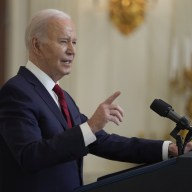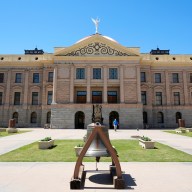TORONTO – Make room in that gaping fiscal hole you’re digging Canada – beleaguered Ontario is jumping in with $56.8 billion in deficit spending over seven years.
The province will sink into massive shortfalls as it rips apart its tax system and pumps the economy full of high-octane infrastructure dollars designed to overhaul its economic clunker into a leaner, meaner, more business-friendly machine.
Ontario is leading a parade of deficit spending among the provinces hard hit by the global economic downturn, with only Saskatchewan and Manitoba staying on the sidelines so far.
The federal government is expected to rack up $85 billion in deficits by the spring of 2013, when it hopes to break free from the recession.
But it will take the country’s most populous province until 2015 to balance the books again, pushing its accumulated deficit to about $162 billion.
Ontario’s $109-billion budget will slash corporate taxes to soup up its investment appeal, but may hit the skids with a politically risky plan to merge its provincial sales tax with the five per cent federal GST in 2010 to help reduce business costs.
For consumers, kids’ clothing and shoes, car booster seats, diapers, books and new homes under $400,000 are among the items to be exempt from Ontario’s eight per cent portion of the 13 per cent harmonized sales tax.
But a score of other items won’t escape the new levy, including gasoline, home heating fuel and real estate fees. Even haircuts and beauty treatments will be hit.
Quebec, Nova Scotia, New Brunswick and Newfoundland and Labrador have already harmonized their sales taxes with the GST, a move that became politically unpopular for some when consumers ended up paying more for goods that were previously exempt from the provincial tax.
But of all the provinces, Ontario got the sweetest deal from Ottawa, which is kicking in $4.3 billion over two years to grease the harmonization wheels, experts said.
To ease the pain of switching to a single tax in 2010 and reduce the political fallout, Ontario will give modest income tax breaks to most taxpayers and offer government cheques totalling $1,000 for a family earning under $160,000.
Single people making less than $80,000 will receive $300.
Ontario residents can expect to start seeing the first of three instalments in June 2010.
Businesses will get $4.5 billion in tax cuts over three years and see corporate income taxes drop to 10 per cent by 2013 from the current 14.
It was a stunning detour for a Liberal government that repeatedly thumbed its nose at its federal masters for demanding that Ontario slash taxes to that level to spur investment.
This year, tax reform isn’t just necessary, it’s “essential,” said Finance Minister Dwight Duncan, who defended his sudden about-face.
“This package is the right package for the right time,” he said.
“The world’s changed since last year… I never imagined a George Bush administration would nationalize banks. I never thought I’d see things like that.”
While past Liberal budgets splurged on education and health, this one will try to rev up a sluggish economy and preserve jobs with $27.5 billion over two years to build hospitals, roads and public transit, with Ottawa kicking in another $5 billion.
Nearly $700 million will be added for skills training.
Ontario will also provide $390 million for its share of a federal green infrastructure program and invest $250 million over five years in green technology.
The province’s poorest will get a boost in welfare rates and $1.2 billion for social and affordable housing.
But the road to economic recovery will be a bumpy one, starting with a record $14.1-billion deficit in 2009-10 and $12.1 billion in the next.
The last time Ontario saw a shortfall that large, the NDP held the province’s purse strings, “Basic Instinct” was big at the box office, Charles and Di’s marriage was on the rocks and Johnny Carson was retiring from “The Tonight Show.”
But relative to government spending, it still won’t top 1992’s $12.4-billion deficit on expenses totalling $57.2 billion.
Rising health-care costs and plunging corporate tax revenues were largely to blame for the province’s $4-billion shortfall in the fiscal year ending March 31.
Ontario will bleed red ink for six more years but stick to a diet of spending less than it takes in, which should allow it to rebalance the books in 2015, Duncan said.
The government will also tighten its belt by freezing salaries for provincial politicians, cutting five per cent of jobs in the public service – in some case, by shifting workers to the federal payroll – over three years, and finding $1 billion in “efficiencies” in 2011-12.
It’s the same year that total spending is expected drop by $2.8 billion – its first decline in years.
Ottawa has seen its deficit figures questioned by the federal budget officer just two months after it delivered its budget, but Ontario’s deficit targets are achievable, said TD economist Derek Burleton.
“So yes, they could move to bring the budget into balance sooner, but that would certainly come at the cost of some of the progress made in terms of tax competitiveness and other areas,” he said.
Duncan insists his controversial tax harmonization plan won’t line provincial coffers at the expense of consumers, but opposition leaders were quick to label it a cash grab that would whack disheartened taxpayers in the wallets at a time when they can least afford it.
The budget is “worthless” for people looking for hope in the midst of a painful recession, said interim Progressive Conservative Leader Bob Runciman.
Rather than put Ontario on the path to prosperity, it will saddle the province with the biggest debt in its history, he added.
“It means more taxes today on everything from gasoline to everyday services,” he said.
“And it means more taxes tomorrow when we have to pay for (Premier) Dalton McGuinty’s record deficit.”
The last cheque aimed at compensating consumers hit with higher costs under the tax harmonization plan will go out in June 2011, just a few months before voters head to the polls for an October election.
“The McGuinty government is trying to bribe them with their own money,” said NDP Leader Andrea Horwath.
The budget also failed to deliver significant new money for hospitals or a commitment to hire at least 2,000 more nurses, labour leaders complained.
That money would have stimulated the economy because it would have been spent in the province, said Sid Ryan, president of CUPE Ontario.
“Giving corporate tax breaks – that’s not going to create jobs in this province,” he said.
Ontario’s real gross domestic product – a barometer of its economic health – is expected to fall 2.5 per cent in 2009, after sliding 0.4 per cent in 2008.
The budget predicts the province will recover with 2.3 per cent growth in 2010 and 3.3 per cent in 2011.
















